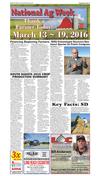12
National
12 Broadcaster Press
March 15, 2016 www.broadcasteronline.com
Week March 13 ~ 19
House Gets a Second Look National Farmers Union College
at Feedlot Zoning Changes Conference On Cooperatives
Introduces Students To Purpose
& Diversity Of Co-Ops
By Bob Mercer
State Capitol Bureau
PIERRE – The state House of
Representatives on Monday will
consider again whether to approve
changes in the process used by
counties for deciding livestock feedlot
permits. Supporters of the legislation
claim it’s necessary to stop round
after round of appeals on the same
application. Opponents argue it’s
an attempt to limit action against a
permit application.
So far the bill’s prime sponsor,
Rep. G. Mark Mickelson, is winning
on a matter that has split South
Dakota agriculture organizations. But
Mickelson, R-Sioux Falls, has also
made several rounds of concessions
to keep the legislation moving
forward. His latest was dropping a
proposed $250 bond for a person
to file an appeal. The House initially
approved the legislation, HB 1140,
on a 51-18 vote Feb. 16. He came
back with amendments at a Senate
committee hearing Feb. 29.
The full Senate voted 20-14
Wednesday. To help ease its passage,
Sen. Larry Tidemann distributed
a nine-point summary to fellow
members. The changes would define
the grounds for appeals and would
set a standard that a person seeking
to appeal has to show he or she
would be aggrieved, according to
Tidemann, R-Brookings. If multiple
appeals were filed on the same permit,
the legislation calls for them to be
consolidated into one action, Sen.
Bernie Hunhoff, D-Yankton, tried to
gut Mickelson’s bill and make just
two small changes. “It’s going to stifle
opportunities,” Hunhoff argued about
Mickelson’s version. “The system is
working in most counties, almost all
counties.”
Hunhoff lost on a voice vote
that nonetheless indicated he had
support from senators in both parties.
That led Senate Democratic leader
Billie Sutton of Burke to call for the
legislation to be rejected altogether.
“I think we need to be very careful
in how we proceed on this matter,”
Sutton said. The House will take up
the legislation as one of its first acts
Monday. The decision will be whether
to agree with the Senate version or
open negotiations in a House-Senate
conference committee.
During the Senate hearing,
Mickelson said he became interested
in the situation because so much feed
and so many livestock are shipped
out of South Dakota. South Dakota’s
economy could benefit if more
livestock were fed here with what’s
grown here, he said. Mickelson said
that’s why he worked to change the
state law last year so county boards
can now make permit decisions with
a simple majority rather than a twothirds majority. He said his intention
this year is to allow the process to
move more quickly to a decision,
by eliminating some of the minor
technical reasons for appeals and
putting the valid appeals on the same
permit into a single proceeding.
Eliminating the $250 bond for
an appeal and straightening out
a typographical mistake satisfied
the concerns Senate Republican
leader Corey Brown of Gettysburg
said he previously had. “It looks to
me like an attempt to streamline
that process,” Brown said. Among
the groups opposing the legislation
are Dakota Rural Action and South
Dakota Farmers Union. Supporting
it are the South Dakota Association
of County Commissioners, the South
Dakota Municipal League, the state
Department of Agriculture, the South
Dakota Farm Bureau, the agricultural
cooperatives association and the
cattlemen’s, pork producers and
soybean organizations.
Young Producers
Experience National
Leadership Conference
HURON – Six young
ag producers from
South Dakota had the
opportunity to attend
the Young Farmers
& Ranchers national
conference held Feb.
12-15 in Kansas City,
Missouri. This American
Farm Bureau Federation
event focused on
leadership and
personal development
opportunities for young
farmers and ranchers
ages 18 to 35.
Chad and Kathy
Hanrahan of Milesville,
Nick and Bekah Ihnen
of Tulare, and Kelsi
LaMont and Travis
Grave of Willow Lake
attended from South
Dakota.
Highlights of the
conference included
hearing from Miss
America Betty Cantrell,
a farm girl from Georgia
who is using her
platform to promote
healthy food choices
and teach kids where
their food comes from,
and Jason Brown,
former NFL football
player who left the
league to start a farm
in his native North
Carolina.
"Nick and I greatly
enjoyed our time
at the national
YF&R conference,"
commented Bekah
Ihnen. "I think our
favorite part of the
conference was the
tours, being able to take
a look at different crops
and farm operations. We
really appreciate being
given this opportunity
through Farm Bureau."
"It was great to meet
some other state YF&R
chairs and lots of new
people. We got to bring
home information that
we can use in our own
operations, our County
Farm Bureaus and our
state YF&R committee,"
added Chad Hanrahan.
Chad and Kathy serve
as co-chairs of the
SDFB Young Farmers &
Ranchers Committee
this year.
In addition to the
keynote speakers,
breakout sessions
were offered on a
wide variety of useful
topics, including: farm
succession planning,
working across
generations, tackling
tough agricultural topics
with consumers, record
keeping for precision-ag
data, using social media
to connect with the offfarm public, and more.
Kelsi LaMont added,
"By far the greatest
part of the conference
was the chance to
network with other
ranchers our age. It's
nice to know we're
not alone in facing
challenges and to make
lifelong friends who
share the same values
and interests. The
travel experience and
educational information
were also much
appreciated."
SDFB President Scott
VanderWal, who was
elected last month as
Vice President of the
American Farm Bureau
Federation, was also a
featured speaker at the
conference, alongside
new AFBF President
Zippy Duvall of Georgia.
,
n PRAIRIE CORDGRASS
From Page 9
When Lake Area
Technical Institute
Agriculture Business
student, Alexa
Olson, thinks about
cooperatives, she
immediately pictures
the grain elevator in her
hometown.
Until recently.
Today, the image in
her mind is much
more diverse. Olson
just returned from the
National Farmers Union
College Conference
on Cooperatives held
Feb.19-21, 2016, in
Minneapolis.
"During the conference
we visited a grocery
store that was a
cooperative. I was
impressed by the fact
that cooperatives
are much more than
grain and agriculture
focused," she said.
Her classmate, Jeffrey
York, agrees.
"Before this trip
I never thought of a
sporting goods store
or grocery store as
cooperatives. It really
opened my mind to
how the cooperative
business model can be
used to meet various
needs," says York, an
Agriculture Business
and Commodity
Merchandising student.
"This trip made what
we learn in class
applicable."
Opening students'
minds to the diversity of
cooperatives operating
throughout the U.S.
is one reason John
Brennan, Agriculture
Instructor at Lake Area
Technical Institute,
makes the trip to
Minneapolis with his
students each year.
"We receive a lot
of information on
cooperatives that you
don't get anywhere
else. We get to see
cooperatives that
make you think
outside the box and
understand that the
cooperative model can
be a fit for a multitude
of businesses," Brennan
explains.
More than 20 Lake
Area Tech students
attended the conference
held in Minneapolis.
They were sponsored by
South Dakota Farmers
Union.
"Getting young
people excited about
cooperatives and
providing them with
insights on how they
work is important to the
future of cooperatives,"
says Doug Sombke,
SDFU President.
"Cooperative and
cooperative education is
part of what we do as a
grassroots organization
¬ it's the reason Farmers
Union was established
more than a century
ago."
Isaac Gosseling, an
Agriculture Production
student and third
generation farmer, says
Lucas Lentsch To Depart As
Secretary Of Agriculture
doesn’t damage the grass.
“They have the potential
to be used as biological
controllers,” Johnson
said.
Next, the researchers
PIERRE – South
need to determine what
can be done to enhance Dakota Secretary of
Agriculture Lucas
these parasitic wasp
Lentsch announced
populations and what
population levels will be today his plans to depart
the Department of
needed to prevent seed
damage. Avoiding the use Agriculture (SDDA) near
of pesticides will reduce the end of March 2016
for an opportunity in the
input costs, which is
important for a crop that private sector.
Lentsch, originally
has a lower profit margin,
from Marshall County,
he pointed out.
has served as secretary
In addition,
researchers must address since April 2013. Prior to
the issue of monoculture his appointment, Lentsch
had served as SDDA’s
versus mixed grass
communities, according director of agricultural
development.
to Johnson. “Can we
put big blue stem in one “Over the past five
area, prairie cordgrass in years, I have thoroughly
enjoyed serving South
one and switchgrass in
Dakota’s farmers,
another to produce, on
average, a good amount ranchers and our
diverse ag industries,”
of biomass—and how
does that affect the insect Lentsch said. “The
opportunity to work
communities?”
He expects that complex, alongside dedicated
public servants as
mixed communities
well as collaborative
will be more stable
stakeholders has
ecologically and have
fewer pest problems. That made the experience
an opportunity of a
may then help increase
lifetime.
production of native
grasses for use in biofuel I am looking forward to
taking on a challenging
production.
leadership role in the ag
sector as well as being
more engaged in our
family cattle operation.”
Gov. Dennis Daugaard
praised Lentsch for his
service.
“Lucas has been
an outstanding leader
in the ag community,
and I appreciate his
hard work,” Gov.
Daugaard said. “He
has been instrumental
in reorganizing the
department to be more
reflective of the dynamic
Jensen
Auto Body
MPCI & Crop Hail
33 years of crop insurance experience
35 years of crop insurance experience.
Dave Hoxeng
44867 303rd St. • Volin, SD 57072
We are an Equal Opportunity Employer
Elk Point, SD
SERVICES AVAILABLE
• Custom Strip Till
• GPS Soil Sampling
• Soil Fertility Planning
• Crop Scouting
• Variable Rate Fertility
Call to discuss Spring Strip Till options
Yankton
JOEY HANSON
Call Scott,
Loren, or Jan
•Assess your spring
needs
•Place your seed
orders
•Discuss grain
marketing
AG SERVICE
605-665-3691 • 1-800-456-5528
We
paint
them
all!
301 W. Main, Vermillion
605-624-2481
THE STRIP TILL
ADVANTAGE
For Your Crop
Insurance Needs
Office: 605-267-2767
Cell: 605-661-1136 • 1-855-969-2767
agriculture industry
it serves. Lucas is an
effective advocate for
agriculture, and I wish
him, Laura and family
well in their future
endeavors.”
The Governor and
his leadership team
will begin immediately
to identify potential
candidates to serve as
the next secretary of
Agriculture.
Cars, Trucks, Tractors & More
Hoxeng Crop Insurance LLC
Main Office:
114 Mulberry St.
Yankton, SD
Grain Storage Facility
located 1 Mile N. of
Mark’s Machinery
that after attending
the conference he is
motivated to become
more involved in his
local cooperative. "My
family has belonged to
the local cooperative for
generations. Serving on
the board of directors
of my cooperative when
I return to the farm has
crossed my mind a few
times ¬ after this trip,
it's something I hope
to do in the future,"
Gosseling says.
"Cooperatives are a
good way to have your
voice heard."
In addition to touring
a sporting goods
and grocery store
cooperative, the college
students learned about
challenges facing the
industry from current
cooperative leaders,
farmers and members.
Participants also
visited several area
cooperatives, including
the nation's largest
agricultural cooperative,
CHS Inc., and the Mill
City Museum, a riverfront museum built into
the ruins of what was
once the world's largest
flour mill.
To learn more about
how S.D. Farmers Union
provides cooperative
education to youth
and the general public,
visitwww.sdfu.org.
n Courtesy S.D.
Farmers Union
Crop Consultant/CCA
605.659.4783 • joey.hanson@diversifiedagronomy.com
• Highly efficient use of fertilizer
by directly placing below the
crops roots and minimizes
tie-up unlike broadcast
applications
• Dual placed nutrients that
promotes early, healthy root
development and creates an
optimum, fertile environment
for seed
• Increases yield while lowers
inputs such as labor, fuel, and
reduced wear and tear on
your equipment
• Offers best of both worlds:
Conservation aspects of no till,
plus, increased yields and soil
quality of conventional tillage
CUSTOM STRIP TILL • CALL 605.659.4783

















 Previous Page
Previous Page





